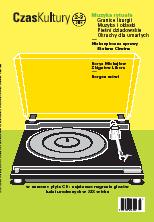Poruszyç skały. O sposobach i okolicznościach wykonywania pieśni dziadowskich
To Move Rocks. How and When Dziadowskie Songs of Vagrants Were Performed
Author(s): Piotr GrochowskiSubject(s): Fine Arts / Performing Arts
Published by: Stowarzyszenie Czasu Kultury
Keywords: Piotr Grochowski: To Move Rocks. How and When Dziadowskie Songs of Vagrants Were Performed; religious and moralistic connotations of folk songs performed by wandering vagrants in the 19th century and the first half of the 20th century; A vagrant’s song wi
Summary/Abstract: Tomasz Janas and Jakub Żmidziński talk to Maciej Rychły. The pleas of wandering vagrants for charity in the 19th century and the first half of the 20th century were usually accompanied by folk songs. Travelling from village to village they offered their prospective benefactors various types of stories in the form of song. These vagrants were usually called dziady and their songs were referred to as dziadowskie songs. Piotr Grochowski notices that these were usually of a religious and moralistic character, praising the power of God who rewarded or punished human deeds. They emphasised the importance of Christian charity with songs about Christ dressed in rags and the poor Lazarus and Job as well as stories of persecuted orphans. Giving hospitality to such vagrants was an important event for rural communities. These travellers acted as messengers who brought with them information and news from the outside world, which the villagers were usually deprived of. The meanings of their songs were usually interpreted directly, thus the aim of the performers, i.e. moving the villagers’ Christian consciences, was achieved and as a consequence they received their rewards. The author stresses, however, that the songs performed by the vagrants played a secondary role. Most important was their function of offering prayers for the dead for which they were also paid. It was believed that a prayer uttered by a vagrant “had exceptional power, particularly with regards to obtaining salvation for souls suffering in purgatory”. At times of indulgences and on All Souls’ Day crowds of vagrants would gather in front of churches or cemeteries. Nevertheless, it often happened that their desire for making money would surpass their honest intentions and as a result the beggars were often mocked or insulted. Furthermore, their frequently observed importunity towards passers-by did nothing to stimulate the charitable feelings in their potential benefactors.
Journal: Czas Kultury
- Issue Year: 2004
- Issue No: 02-03
- Page Range: 73-81
- Page Count: 9
- Language: Polish
- Content File-PDF

